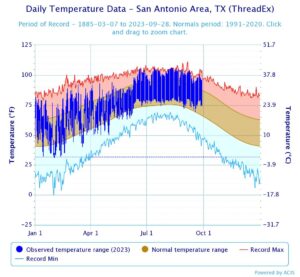We live in a world today where there is a substantial amount of information at our disposal. In fact, so much information is available that it is often hard to determine whether it is true or not. This overwhelming flow of information leads some to conclude that something factual is wrong or simply cannot be true, and they may deny the potential significance of the information. Such misconceptions are not new. In particular, misconceptions and controversy regarding climate science extend back into the 1980s, and continue today, despite improvements in our understanding.1
Climate can be viewed as the average air temperature, humidity, winds, rain, and frequency of extreme weather events over a long period of time.2 Armed with this information, one might tend to think that ” ‘… if people only knew the facts,’ they would act differently”.3 Despite having access to more information about climate change than ever before, however, people still do not act any different.
San Antonio, Texas is one city that has focused on incorporating scientific understanding into its decision-making processes, adopting the Climate Action and Adaptation Plan (CAAP) in October 2019. The CAAP is intended to lay out “… a roadmap to reduce carbon emissions, adapt to a changing climate, and ensure San Antonio remains healthy, vibrant place for generations to come.4
In the face of global warming a city like San Antonio does not deny but adapts.

San Antonio continues to make moves towards being climate change-ready, and the CAAP provides a road map for taking steps to prepare for unforeseen weather extremes that may result from climate change. San Antonio aims to increase carbon-free energy, reduce energy consumption for buildings and transportation, promote recycling, promote biodiversity, while also educating and empowering its citizens.7
The 2024 budget created in 2023 shows that a consistent focus on adaptation. For example, a total of $8.9 million is set for the Resiliency, Energy Efficiency and Sustainability (REES) fund, with $3 million set as a Reserve.8 The budget also sets aside $2.5 million for community sustainability grants to provide communities with mitigation and adaption programs that follow the SA Climate ready plan. $3 million is set aside for UHI mitigation that will direct weatherization improvements or address structural deficiencies. The budget includes $1.5 million to be used for Business UHI Mitigation and Sustainability Incentive Programs that will provide incentives for business’ that make adaptations in line with the CAAP.9
At the same time, however, the Texas state government has worked to disrupt climate action and adaptation plans like San Antonio’s. Texas state legislators ignored requests made by climate advocates for critical reform during the recently concluded 2023 legislative session. For example: “Senate Bill 1017 which blocks cities from adopting ordinances that prohibit engines based on their fuel source” is one such bill that stops cities from taking action to reduce pollution.10 Another bill, Senate Bill 1860, now requires “cities to get permission from the Legislature before approving changes to their charters that purport to address climate change” are now laws that are effective as of September 1, 2023.11
The Texas legislature has a frequently resisted attempts to address climate change. For example, on January 28th, 2021, when the U.S. Environmental Protection Agency (EPA) recommended revisions to strengthen the regulation of oil and gas, Governor Greg Abbott responded by issuing “Executive order No, GA-33 relating to protection of Texas’ energy industry from federal overreach.” 12 Abbott highlighted that “overreach in the energy sector, by contrast, can damage the stability of the Texas economy” because “hundred of thousands of Texans are employed by the energy industry; and billions of dollars in taxes and royalties flow to Texas every year thanks to the hard work and innovation of the energy industry”.13 Abbott’s view is common among the contentious politics that surround the economics of climate change: “Research has frequently shown that economic and development priorities take precedence over adaptation action”.14
Government actions such as this come even after polls done by the University of Texas/Texas Tribune show that “…two-thirds of Texas registered voters believe climate change is happening”.15 Similarly, a study at Yale University found that 65% of Texans worry about climate change while “…clear majorities said they want politicians to do more about it”.16 It is clear that while most Texans are aware of climate change and want to take action, Texas state policies are tending to conflict with a unified approach to addressing climate change.
Texas government seems to be in denial of climate change, and doesn’t see anything wrong. Right? Well, during the same record-setting heat wave that hit Texas this summer, Governor Abbott, and U.S. Senators John Cornyn and Ted Cruz asked for federal government support to help pay for expensive coastal defenses to protect Galveston and surrounding areas from the sea level rise and mega-storms associated with climate change.17 Texas’ politicians have often denied any connection between human burning of fossil fuels with increasing global temperatures and rising sea levels.18 However, instead of accepting the problem and admitting the need for action to address climate change, Abbott vowed in March 2023 to” …exclude renewables from any revived economic incentive program”.19 In a news conference in Austin, Governor Abbott stated “I support [the program] not providing economic incentives for renewables” and that “There’s already federal incentives for renewable projects and those will continue to be allowed.”20
However, government responses based on climate denial may stem from the personal understanding and beliefs of important political figures. Preconceptions make it hard to change the minds of individuals who are stuck to their own way of thinking. “Adaptation requires all actors whether public, professional, or politician to perceive a high level of risk and feel that preparing is within their responsibility and capacity”.21 In contrast to the graffiti, rising water levels represents a clear risk to building in Figure 2, the Texas government officials don’t see a big enough risk to believe that a response is warranted. The San Antonio government, however, perceives a high level of risk and finds it to be within their responsibility and capacity to adapt. At the state level, however, Texas does not perceive a high level of risk, and therefore does not find it within their responsibility to act.

How do we solve this apparent dilemma? In 2022, Joshua Basseches and others have proposed a simple structure to help move climate change policy forward. Climate advocates must improve their ability to navigate and play the game of politics. They must campaign and provide financial support for politicians who have a positive view on combating climate change. Climate change advocates must provide better quality climate information that offers a tailored media message in a way that depoliticizes responses to climate change, while staying away from what has historically been generic, untailored, untargeted communication. The use of political IOUs can also play a role in leveraging support for climate policy in the form of incentives.22 Playing the game of politics, campaigning and financially supporting politicians, and using IOUs while tailoring media will give power and backing to political actors who support climate change policy. This simple structure hopes to lessen the divide between climate views allowing for green business, energy firms, energy efficiency consultants, green capital while being a starting point to further advance climate change policy.
What will it take for a climate-denying government to act before it is too late? We continue to see extreme weather events on both sides of the spectrum, from a snow storm that blanketed Texas in February 2021, to major hurricanes in the Gulf of Mexico, to an extreme, record-breaking heat wave in 2023. Just as Texans can only depend so much on their city governments, cities can only do so much depending on their state government. The Texas government is an example of how climate-denial at the state level can counter efforts taken at the local level by an active, adaptable city government. It will take a broad effort across all levels of government to counter inaction and steer Texas towards a climate-ready future.
- Kari Marie Norgaard. Living in Denial : Climate Change, Emotions, and Everyday Life. Cambridge (Ma), MIT Press, 2011, pp. 64–65. ↵
- Pan Z. 2023 Sep 30. Climate change and global warming. Salem Press Encyclopedia of Science, Research Starters. https://online.salempress.com/articleDetails.do?articleName=Climate3_0123. ↵
- Pan Z. 2023 Sep 30. Climate change and global warming. Salem Press Encyclopedia of Science, Research Starters. https://online.salempress.com/articleDetails.do?articleName=Climate3_0123. ↵
- City of San Antonio. Climate Change in San Antonio. SA Climate Ready. 2019 https://www.sasustainability.com/category/climate-change-in-san-antonio. ↵
- US Department of Commerce N. Local Climate Records. www.weather.gov. https://www.weather.gov/ewx/climate. ↵
- Proposed Budget Office of Sustainability. 2022. https://www.sanantonio.gov/Portals/0/Files/budget/FY2023/WorkSessions/SustainabilityWorksession.pdf. ↵
- City of San Antonio. Climate Change in San Antonio. SA Climate Ready. 2019 https://www.sasustainability.com/category/climate-change-in-san-antonio. ↵
- City of San Antonio. 2023. Adopted Operating & Capital Budget – FY2024. https://www.sanantonio.gov/portals/0/files/budget/fy2024/Adopted-Budget-2024.pdf. ↵
- City of San Antonio. 2023. Adopted Operating & Capital Budget – FY2024. https://www.sanantonio.gov/portals/0/files/budget/fy2024/Adopted-Budget-2024.pdf. ↵
- Martinez, Erin Douglas, Emily Foxhall and Alejandra. “Climate Proposals Withered at the Texas Capitol This Year.” The Texas Tribune, 2 June 2023, www.texastribune.org/2023/06/02/texas-environment-climate-energy-bills-legislature/. ↵
- Martinez, Erin Douglas, Emily Foxhall and Alejandra. “Climate Proposals Withered at the Texas Capitol This Year.” The Texas Tribune, 2 June 2023, www.texastribune.org/2023/06/02/texas-environment-climate-energy-bills-legislature/. ↵
- Abbott Greg, EO-GA-33, Jan. 2021, Office of the Governor of the State of Texas, https://gov.texas.gov/uploads/files/press/EO-GA-33_protection_of_Texas%e2%80%99s_energy_industry_IMAGE_01-28-2021.pdf. ↵
- Abbott Greg, EO-GA-33, Jan. 2021, Office of the Governor of the State of Texas, https://gov.texas.gov/uploads/files/press/EO-GA-33_protection_of_Texas%e2%80%99s_energy_industry_IMAGE_01-28-2021.pdf. ↵
- Birchall SJ, Kehler S. 2023. Denial and discretion as a governance process: How actor perceptions of risk and responsibility hinder adaptation to climate change. Environmental Science & Policy. 147:1–10. doi: https://doi.org/10.1016/j.envsci.2023.05.017. https://www.sciencedirect.com/science/article/abs/pii/S1462901123001454. ↵
- Ramsey, Ross. “Texans Say Climate Change Happening, but It’s a Partisan Issue, Poll Finds.” The Texas Tribune, The Texas Tribune, 6 Nov. 2019, www.texastribune.org/2019/11/06/texans-say-climate-change-happening-highly-partisan-issue-uttt-poll/. ↵
- Beer, Mitchell. “65% of Texans Worry about Climate, but “Broadscale Voter Suppression” Impedes Action.” The Energy Mix, 29 Apr. 2022, https://www.theenergymix.com/65-of-texans-worry-about-climate-but-broadscale-voter-suppression-impedes-action/#:~:text=In%202021%20polling%20by%20the,to%20do%20more%20about%20it. Accessed 16 Sept. 2023. ↵
- Linden, Eugene. “As Texas Heats Up, Its Climate Denying Politicians Seek Federal Help.” Time, 29 June 2023, time.com/6291179/texas-climate-impacts-and-science-denial/. Accessed 16 Sept. 2023. ↵
- Linden, Eugene. “As Texas Heats Up, Its Climate Denying Politicians Seek Federal Help.” Time, 29 June 2023, time.com/6291179/texas-climate-impacts-and-science-denial/. Accessed 16 Sept. 2023. ↵
- Linden, Eugene. “As Texas Heats Up, Its Climate Denying Politicians Seek Federal Help.” Time, 29 June 2023, time.com/6291179/texas-climate-impacts-and-science-denial/. Accessed 16 Sept. 2023. ↵
- Svitek P. 2023 Mar 2. Gov. Greg Abbott vows to exclude renewable energy from any revived economic incentive program. The Texas Tribune. https://www.texastribune.org/2023/03/01/chapter-313-texas-renewables-economic-development/. ↵
- Birchall SJ, Kehler S. 2023. Denial and discretion as a governance process: How actor perceptions of risk and responsibility hinder adaptation to climate change. Environmental Science & Policy. 147:1–10. doi: https://doi.org/10.1016/j.envsci.2023.05.017. ↵
- Basseches JA, Bromley-Trujillo R, Boykoff MT, Culhane T, Hall G, Healy N, Hess DJ, Hsu D, Krause RM, Harland P, et al. 2022. Climate policy conflict in the U.S. states: A critical review and way forward. Clim Change. 170(3-4) https://link.springer.com/article/10.1007/s10584-022-03319-w. ↵


